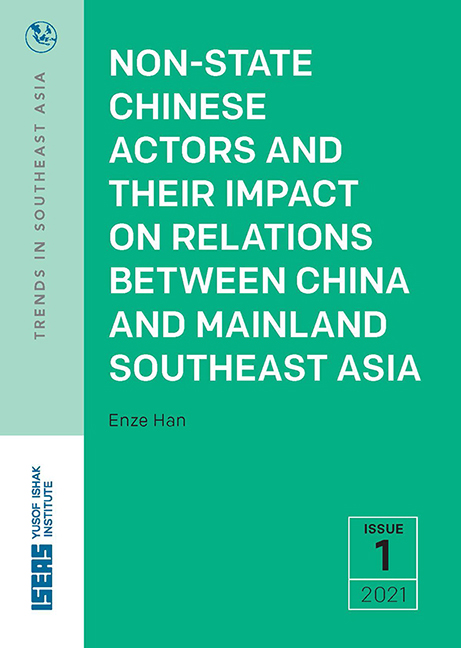Non-State Chinese Actors and Their Impact on Relations between China and Mainland Southeast Asia
Published online by Cambridge University Press: 17 December 2021
Summary
INTRODUCTION
There is a tremendous amount of anxiety in Southeast Asia over the rising power of the People's Republic of China (PRC). Over the past four decades, the formerly dirt-poor communist country has become the world's second largest economy. The colossal size of the Chinese economy plus its massive population looms over Southeast Asian countries across its southern border. Many in the region are not sure what intentions the Chinese state and society have towards them. Indeed, there is a tremendous amount of debate within Southeast Asia about what the rise of China will mean for the region. In one way or another, such uncertainty or debates originate from a lack of consensus on what kind of great power China is. Is it the celestial kingdom of the past that wants to reassert its tributary relations with Southeast Asia? Or is it going to model itself after the Western colonial powers which used to control the region, plunder resources and enslave people? Or will the PRC repeat its revolutionary past, export communist ideologies and support internal insurgencies once again? Or will contemporary China be something totally different?
This paper takes on these questions and proposes that we understand China as an unconventional great power and that its influence in Southeast Asia will therefore be different from other historical or contemporary counterparts. Departing from conventional international relations approaches that tend to overwhelmingly focus on how the Chinese state or state-related actors exert influence, this paper instead focuses on how Chinese non-state actors have substantial impact on state-society relations in Southeast Asia, which in turn affect state-to-state relations as well. This exclusive focus on non-state actors is to compliment the large body of literature that has already examined the issue from the state angle, and to look at the complex nature of diverse non-state actors coming from China that have deep implications for Southeast Asia.
This paper first presents the foundation for conceptualizing China as an unconventional great power and the need to look at diverse actors, particularly non-state ones, in their presence and influence in Southeast Asia. It then illustrates with three examples—Chinese tourism in Thailand, agricultural transformations in Myanmar, and casino economies in Cambodia. In all three cases, non-state actors from China have left substantial imprints on local economies as well as state-society relations and these ultimately have repercussions for bilateral relations at the state level as well.
- Type
- Chapter
- Information
- Non-State Chinese Actors and Their Impact on Relations between China and Mainland Southeast Asia , pp. 1 - 19Publisher: ISEAS–Yusof Ishak InstitutePrint publication year: 2020



